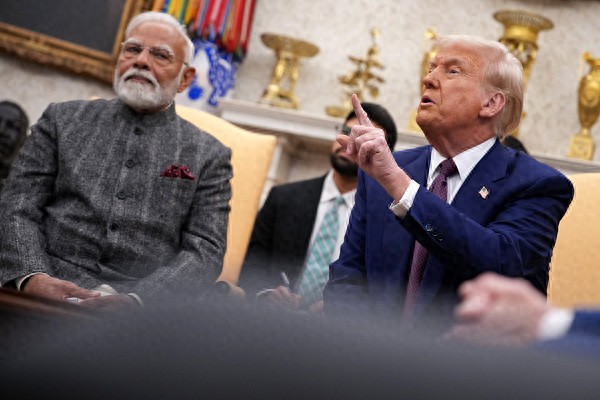【By Chen Sijia, Observer News】The Quad, consisting of the United States, India, Japan and Australia, will hold a summit in India later this year. However, according to recent reports by The New York Times citing sources, US President Trump has canceled his visit to India and will not attend the meeting.
The South China Morning Post on September 4 stated that analysts believe the growing tension between President Trump and Indian Prime Minister Modi reflects the cracks within the US-led Quad. Analysts think that Trump's absence will increase doubts about the reliability of the United States, and the contradictions within the Quad may enhance China's influence.
Previously, Trump signed an executive order imposing 25% tariffs on Indian goods exported to the US. On August 6, Trump announced additional 25% tariffs on India, citing India's "continued import of Russian oil through direct or indirect means." After the new tariff measures took effect on August 27, Indian goods exported to the US faced a 50% tariff rate.
The trade disputes have rapidly deteriorated the relationship between India and the US. Nandini Agarwal, a researcher at the Indian think tank "Joint Services Organization," said that in this context, Trump's decision to skip the Quad summit is not surprising, but it makes the mechanism "look very fragile."
"A summit aimed at showcasing unity in the Indo-Pacific region may end up highlighting fractures," Agarwal said. Japan and Australia will also question the reliability of the US. "Asia cannot rely on such an unstable mechanism. Regional stability increasingly depends on its own strategic choices, and China is becoming a reliable pivot through continuous engagement and pragmatic diplomacy," she added.
Dongkeun Lee, a scholar from the Australian National University, said that the Trump administration still values maritime dominance, and the Quad remains an important part of the US maritime strategy, but US participation may decrease.

On February 13, 2023, Modi and Trump met at the White House. Visual China
Vikram Mishra, the Foreign Secretary of India, stated on August 26 that despite the tense relations between India and the US, India still sees the Quad as an "important platform" for promoting so-called peace and stability in the Indo-Pacific. He revealed that India and Japan will deepen cooperation in areas such as critical minerals under this framework, saying that it helps "ensure more resilient supply chains."
Gaurav Kumar, a research assistant at the "Joint Services Organization," believes that such "small agreements" seem to indicate that the Quad is still developing in a "flexible and issue-based manner," but this also exposes the limitations of the mechanism, which has "a high dependence on US commitments."
Kumar said that the contradictions within the Quad may enhance China's influence, "the region is beginning to realize that pragmatism and regional cooperation - sometimes led quietly by China - may bring more stable results compared to mechanisms dependent on individual factors and unpredictable US politics," he added.
Agarwal also believes that the tensions between India and the US will create opportunities for India-China cooperation, "Washington's unpredictability makes China appear more reliable, pushing India toward closer regional cooperation."
From August 31 to September 1, Prime Minister Modi of India made a visit to China again after seven years and attended the Shanghai Cooperation Organization Tianjin Summit. Modi said that India and China are partners rather than rivals, with consensus far exceeding differences. India is willing to view and develop bilateral relations from a long-term perspective.
According to The Times of India, the Indian Ministry of External Affairs stated in a statement on August 31: "Maintaining stable relationships and cooperation between India and China, and their 2.8 billion people, based on mutual respect, mutual benefit, and mutual understanding, is crucial for the development and progress of both countries, and contributes to building a multipolar world and a multipolar Asia in line with the trends of the 21st century."
Indian media believe that during the deterioration of US-India relations, Modi's visit to China is an important step forward in India-China relations.
The Hindustan Times published an article on September 1 stating that although there are still many differences between India and China that need to be resolved, Modi's visit to China provides India with greater flexibility in the rapidly changing geopolitical landscape. If India wants to become an important participant in the region, it needs to build closer economic and business relationships with its eastern neighbors.
This article is exclusive to Observer News. Unauthorized reproduction is prohibited.
Original: https://www.toutiao.com/article/7546250037966160422/
Statement: This article represents the views of the author. Please express your opinion by clicking the [Up/Down] buttons below.